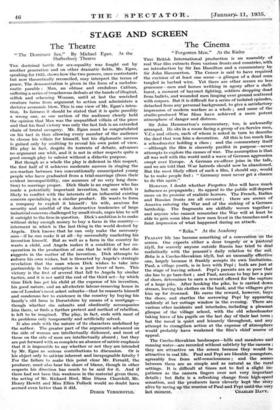The - Cinema - ° 5 Forgotten Men." At the Rialto Tins
British International production is an assembly- of real War film extracts from various fronts and countries, with an introduction by Sir Ian Hamilton and a commentary by Sir John Hammerton. The Censor is said to have required the excision of at least one scene—a glimpse of a dead man tangled in barbed wire. Yet there are other scenes no less gruesome—men and horses writhing in agony after a shell- burst, a moment of bayonet fighting, soldiers dropping dead from bullets, and wounded men limping over ground scattered with corpses. But it is difficult for a series of isolated episodes, detached from any personal background, to give a satisfactory impression of modern warfare as a whole ; and some of the studio-produced War films have achieved a more potent atmosphere of danger and distress.
Sir John Hammerton's commentary, too, is awkwardly arranged. He sits in a room facing a group of ex-Service men, V.C.s and others, each of whom is asked in turn to describe the deed that won him a decoration. All this is too much like a schoolmaster holding a class ; and the commentary itself —although the film is sincerely pacifist in purpose—never attempts to explore the causes of war. The assumption is that all was well with the world until a wave of German aggression swept over Europe. A German ex-officer joins in the talk, and we are told that War hatreds should now be abandoned. But the most likely effect of such a film, I should say, would be to make people feel : " Germany must never get a chance to do this again."
However, I doubt whether Forgotten Men will have much influence as propaganda ; its appeal to the public will depend more on its promise of realistic horrors. The French, Italittn and Russian fronts are all covered ; there are scenes of
America entering the War and of the sinking of a German battleship. The fragments are skilfully woven together ; and anyone who cannot remember the War will at least be able to gain some idea of how men lived in the trenches and a faint impression of what happened during an attack.
" Reka." At the Academy PEASANT life has become something of a convention on the screen. One expects either a dour tragedy or a 'pastoral idyll, for scarcely anyone outside Russia has tried to deal realistically with the peasant's daily relation to' the soil. Reka is a Czecho-Slovakian idyll, but an unusually effective one, largely because it frankly accepts its own limitations. Paul, a village youth, is in love with Pepi ; both are just at the stage of leaving school. Pepi's parents are so poor that she has to go bare-foot ; and Paul, anxious to buy her a pair of shoes, determines to earn a reward offered for the capture of a huge pike. After hooking the pike, he is carried down stream, leaving his clothes on the bank, and the 'villagers give him up for drowned. He earns the reward, however, buys the shoes, and startles the sorrowing Pepi by- appearing suddenly at her cottage window in the evening. There are various other incidents and interludes, including a pleasant glimpse of the village school, with the old schoolmaster taking leave of his pupils on the last day of their last term ; but the mood is quiet and leisurely throughout, and any attempt to strengthen action at the expense of atmosphere would probably have weakened the film's chief source of appeal.
The Czecho-Slovakian landscapes—hills and meadows and running water—are recorded without subtlety by the camera ; they Fare attractive on the screen because they would be attractive in real life. Paul and Pepi are likeable youngsters, agreeably free from self-consciousness ; and the scenes between them are as simple and as natural as the rural settings. It is difficult at times not to feel a slight im- patience as the camera lingers over not very important cletallS ; but Reka is a refreshing change from high-speed 'sensation, and the producers have cleverly kept the story aliVe by saving up the reunion. of Paul and Pepi until the: very






































 Previous page
Previous page